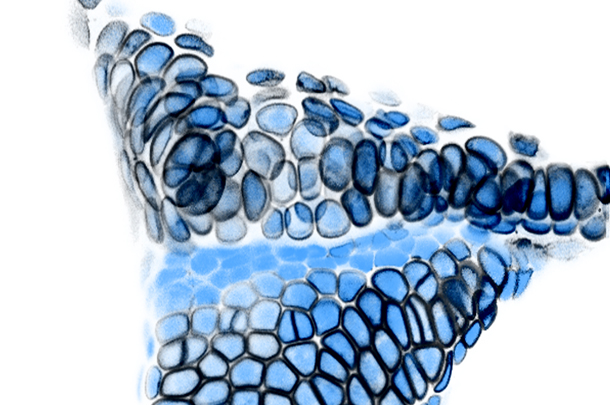Arthritis, the leading cause of disability in the U.S., involves the loss of a special type of cartilage cell lining the joints. In a study appearing on the cover of the latest issue of Developmental Cell, first author Amjad Askary — a PhD student in the USC Stem Cell lab of Gage Crump, PhD — and his colleagues identify roles for a family of genes, called Iroquois (Irx) genes, in protecting these joint cartilage cells.
Some types of cartilage serve as temporary scaffolds that are later replaced by bone, but joint cartilage remains perpetually cushiony, flexible and immature. In order to better understand how this works, the researchers took advantage of the fact that a joint in the zebrafish jaw, called the hyoid joint, contains high levels of one member of the Irx family, Irx7. When the researchers used gene editing to create mutant zebrafish lacking this gene, the wrong type of cartilage formed at this joint. They then showed that Irx genes promote joint flexibility by turning off genes that stiffen more mature cartilage.
Next, the researchers explored whether Irx genes play a role in species outside the fish tank. To do so, Crump’s team collaborated with the neighboring labs of Justin Ichida, PhD, Francesca Mariani, PhD, and Andy McMahon, PhD — all located in the Eli and Edythe Broad Center for Regenerative Medicine and Stem Cell Research at USC — to show that a related Irx gene could repress the maturation of cartilage in mice.
“The Irx genes may be a core machinery that prevents cartilage maturation in species across the animal kingdom,” said Crump, the study’s corresponding author and associate professor of stem cell biology and regenerative medicine at USC. “This raises intriguing questions: Can we harness the effects of these genes to encourage stem cells to differentiate into new joint cartilage, and do mutations in these genes play a role in inherited osteoarthritis?”
Additional co-authors on the study from USC include Lindsey Mork, PhD; Sandeep Paul, PhD; Xinjun He, PhD; Audrey Izuhara; and Suhasni Gopalakrishnan, PhD; plus Sonja Dabizljevic and Rodney Dale from Loyola University Chicago.
Funding came from the National Institutes of Health, March of Dimes, an A.P. Giannini Foundation fellowship and the Loyola University Chicago’s Provost office.
— Cristy Lytal
https://www.youtube.com/watch?v=wULX-3G4CF4&feature=youtu.be


